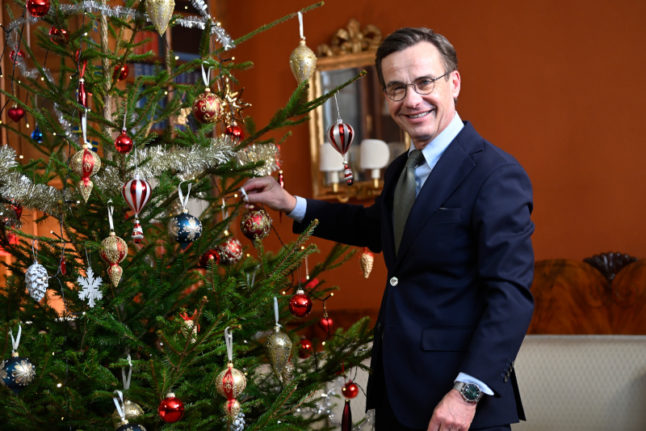Hej,
God fortsättning (“happy continuation“) as we say in Sweden after major holidays. I hope you’re enjoying the last week of 2022 – what a year.
‘Tis also the season of Christmas speeches.
Prime Minister Ulf Kristersson gave his first Christmas speech since his Moderate-led right-wing coalition government won the election.
It wasn’t exactly festive.
Kristersson predicted tough years ahead for Sweden. He spoke of “three parallel crises”: gang crime and shootings, the global security crisis sparked by Russia’s attack on Ukraine, and the energy and financial crisis.
He mentioned the government’s responsibility, but also stressed people’s personal responsibility to weather financial storms, prevent young people falling into crime through active parenting or valuable friendships, and defend Sweden by for example signing up for military service.
In fact, public radio broadcaster SR’s political expert Fredrik Furtenbach counted that the word ansvar (“responsibility”) made at least 30 appearances in the 2,795-word speech (I counted 31 in the written text).
Olle Lönnaeus, a political reporter for the independent-liberal newspaper Sydsvenskan, dryly noted that Kristersson blamed most of the problems on the Social Democrats and pointed out that his support is low despite the fact that governments usually get a poll boost from times of crises.
That said, Kristersson has been in power for roughly two months so there’s still time for his support to go up or down. Sweden will hold its next general election in 2026. The financial downturn is expected to last throughout his premiership. How his government handles it will quite possibly be the key factor that defines his time as prime minister.
Social Democrat leader Magdalena Andersson by contrast spoke in her Christmas speech of people’s need to find light in dark times, and that such light exists when we stand up for what’s right and help each other out – although she, too, also focused a lot on the various crises.
She attacked Kristersson on the election pledges his government has already broken (their energy support failed to meet its deadline, plans to pause a requirement to pay back interest on mortgages were put on hold), clearly hoping that this is what will stick in the voters’ minds.
That said, as Aftonbladet’s political writer Lena Mellin pointed out, Andersson has “the world’s easiest job” as opposition leader in tumultous financial times, even though the crisis wasn’t caused by the government. “She only has to say ‘electricity price’ and support goes down for the government’s three parties as well as for their Sweden Democrat allies.”
King Carl XVI Gustaf, too, gave his annual Christmas speech – his 50th – on Sunday. His role is non-political, so his speech was naturally of a slightly different character to the ones by Kristersson and Andersson.
The start of the speech looked back at some of his visits to Ukraine, including to Gammalsvenskby in 2008 – a village hit hard by Russia’s invasion. Then, he spoke about the year ahead – when he will have been King of Sweden for 50 years, and when 500 years will have passed since King Gustav Vasa founded the modern nation state of Sweden.
Finally, he spoke of gratitude to those who came before us and our generation’s responsibility to preserve what they built. He didn’t say so explicitly, but there was a hint of environmentalism there: “The fields we harvest. The forests we build our houses out of. The trees we get our Christmas apples from. For generations, people have planted and sown, looked after forest and land – and passed them on for us to manage.”
Owe Nilsson, a well-known political reporter at TT, Sweden’s main news agency, has left his job after 38 years, following a dispute with his employer over a tweet in which he criticised the government for not extending a funding scheme to an anti-Semitism organisation.
His TT bosses thought he was voicing too much of a political opinion in the tweet and tried to reassign him to subediting duties. It ended with Nilsson himself quitting, which sparked surprised reactions from high-ranking politicians, both left and right-wing. Nilsson had been around for so long he had almost become part of the parliamentary furniture.
Who did Swedish newspapers write about the most in the past year? The answer is Vladimir Putin, according to research by Retriever and TT. Former Prime Minister Magdalena Andersson takes the second spot followed by Ulf Kristersson, who succeeded her in September.
This year’s “rockets”, i.e. those who climbed the rankings the fastest, are Ukrainian President Volodymyr Zelenskyy and Sir Väs, the king cobra who escaped (and then returned to) his enclosure at a Stockholm zoo.
A new inquiry into strengthening security on digital ID services in Sweden will also look at improving access for foreigners temporarily working and studying in Sweden, the minister responsible has told The Local.
Sweden’s new government has halted the former government’s plans to build faster train connections between Gothenburg and Borås and Lund and Hässleholm, a move local politicians called “a disaster”.
Sweden Elects is a weekly column by Editor Emma Löfgren looking at the big talking points and issues after the Swedish election. Members of The Local Sweden can sign up to receive the column as a newsletter in their email inbox each week. Just click on this “newsletters” option or visit the menu bar.




 Please whitelist us to continue reading.
Please whitelist us to continue reading.
Member comments